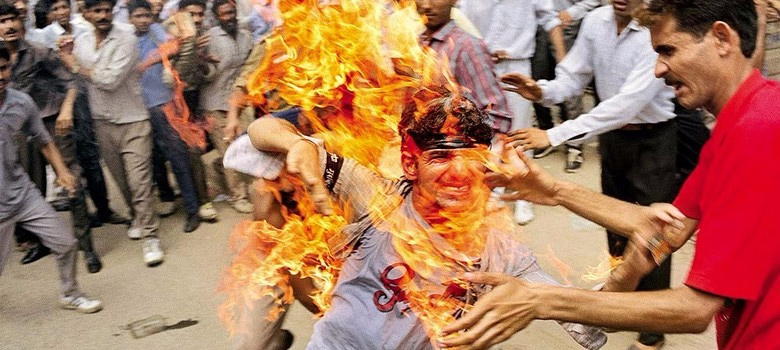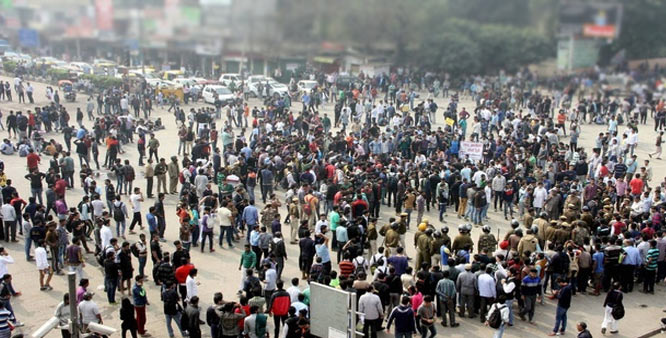- Home›
- News›
- Dalit To Gurjars, 5 Quota Reservation Protest Which Turned Violent And What Is Their Current Status
Dalit To Gurjars, 5 Quota Reservation Protest Which Turned Violent And What Is Their Current Status
By: Pinki Sun, 05 Aug 2018 12:18:50

Recently the rise in demands for reservations have increased. The Maratha quota stir which has gained quite some momentum in Maharashtra has now caught the attention of BJP-led Central government. The Maratha quota stir which caught the Maharashtra government and Centre off-guard, because of which the state government has got sleepless nights and have lined series of meeting with leaders from across the state.
Last year when the Maratha community held protest which was peaceful suddenly turned violent during a recent protest on July 25, 2018. The Maratha Kranti Morcha, which is spearheading the agitation has put forth demands like Punishment to culprits in Kopardi rape and murder case, Reservation in education and government jobs, Implement recommendations of National Commission on Farmers chaired by Dr. M. S. Swaminathan and Amendment in Scheduled Caste and Scheduled Tribe (Prevention of Atrocities) Act, 1989 to stop its misuse. Apart from these the community also seeks all cases against Maratha protesters be taken back, action against the officers responsible for firing and lathi charge during July 25 protest, resignation or sacking of ministers MLAs who gave irresponsible statements against Maratha community.
This is not the first time, the agitation by a certain community demanding reservation went violent. Here is some other agitation which bought the country to its knees:
* Dalit protest
When: Dalit organisations called for a Bharat Bandh on April 2, 2018 following the alleged dilution of the Scheduled Castes and Tribes (Prevention of Atrocities) Act, 1989, or the SC/ST Act that protects marginalized communities against discrimination and atrocities.
Why: On March 20, 2018 the Supreme Court expressed concern over misuse of the Act and ruled against the automatic arrest of the booking of accused under the law and introduced the provision of anticipatory bail. This means that the arrest of an accused under the Scheduled Castes and the Scheduled Tribes (Prevention of Atrocities) Act is not mandatory and action will be taken only after preliminary inquiry and sanction by competent authorities. The Supreme Court ruled that public servants cannot be prosecuted without the approval of the appointing authority and citizens too should be arrested only after an inquiry under the law. This triggered widespread criticism from the Dalit community, which claims that the top court’s order will lead to more discrimination and crime against backward communities.
Present: Moving to placate angry Dalit and Adivasi outfits which have called a Bharat bandh on August 9, 2018 over the alleged dilution of the SC/ST law, the Union Cabinet approved an amendment to The Scheduled Castes and the Scheduled Tribes (Prevention of Atrocities) Act which, official sources said, would “nullify” the March 20 Supreme Court order and “remove any room for interpretation” by the courts.

* Patidar Agitation
When: The Patidar movement in Gujarat, led by Hardik Patel (convener of Patidar Anamat Andolan Samiti) turned violent. In July 2015, the protest which began in a peaceful manner took an ugly turn when police tried to arrest Hardik in a midnight raid. Protesters went on a rampage attacking police and public transport, torching many vehicles. An FIR had been filed against eight people and a mob of 500 people in the case.
Why: The Patidar community is seeking Other Backward Class (OBC) status and reservation in educational institutions and public/private sector job. In May 2016, the Gujarat government announced an ordinance to provide 10 percent reservation for economically backward classes (EBC) among upper castes. Families that earn less than Rs 6 lakh per year will qualify for the quota. In August 2016, the Gujarat High Court quashed the ordinance.
Hardik Patel, and two of his aides – Lalji Patel and AK Patel – were found guilty of rioting, arson, damage to property and unlawful assembly and were sentenced to two years in jail in 2015 Visnagar rioting case. The three were fined Rs. 50,000 apart from the two-year imprisonment. Soon after the verdict, he and two others were granted bail.
At Present: Hardik Patel has recently again have appealed to the leader of Gujarat to help him renew the agitation for Patidar reservation.
* Gurjars Community agitation in Rajasthan
When: The Gurjar community held a 10-day protest in May 2015 demanding reservation. Thousands of Gujjar community members blocked railway tracks for days, bringing train traffic to a halt in Rajasthan. The community had organised similar protests in 2008, and 2010 led by Kirori Singh Bainsla, who, despite several rounds of talks with the government, couldn’t reach an agreement.
Why: Violence erupted in the state of Rajasthan on 23 May 2008 when police fired on protesters belonging to the Gurjar caste who were demanding a lower scheduled tribe status, instead of their current OBC (Other Backward Class) status and a 5 percent quota in government jobs. In retaliation, the protesters lynched a policeman in the Bharatpur district of Rajasthan. In response, police shot at protesters as they tried to damage railway lines and government property. At least 15 were killed on the spot.
Present: The community called off the demonstration only after the government announced it would provide five percent reservation to Gujjars in the Special Backward Classes category and another 14 percent reservation for the Economically Backward Classes among the upper castes.

* Jat quota stir
When: In February 2016, Haryana saw violent protests by the Jat community demanding quota in jobs and educational institutions which virtually brought Haryana to a halt. Around 30 people were killed and more than 300 people injured in the protests.
Why: During the Jat movement in February, many ridiculed their claim for OBC status as they are seen as one of the most affluent communities in north India. This wasn’t for the first time, the Jats demanded OBC status. In fact in many states like Delhi, UP, Rajasthan (except Bharatpur and Dholpur), the Jats are in state list of OBC.
Gurnam Singh Commission, constituted in 1990, had listed Jats among the backward classes. But despite several promises, the Jats weren’t given OBC status. The UPA government in 2014 inducted the Jats into Centre’s OBC list, but the case didn’t stand the scrutiny in Supreme Court and quota given to the Jats got quashed.
Similarly, in Haryana, the Punjab and Haryana High Court in September 2014 had removed the Jats and other four castes from the state’s Special Backward Classes (SBC), which irked the Jats who form a majority community in Haryana with over 50 percent of the land holdings.
Present: In March 2018, the Supreme Court ordered status quo on the operation of the Punjab and Haryana High Court verdict, which upheld the constitutional validity of the law providing ten percent reservation to Jat and five other communities in Haryana, till further orders.
* The Kapu community protests in Andhra Pradesh
When: The Kapu community in Andhra Pradesh has been demanding OBC status for nearly three decades. Kapus claim that they were classified as BC until 1960 when their status was changed and quota benefits revoked.
Why: The Kapus are primarily an agrarian community-based in the Andhra-Telangana region. It is one of the dominant caste groups with political influence in the state. The Kapu community comprises nearly 26% of the state’s five crore people.
Saying that they are falling behind in terms of jobs and education, the Kapu community is demanding inclusion in the ‘Backward Castes’ category “like they were before independence”. ‘Backward Castes’ is a collective term covering socially and educationally deprived groups in the country. The mid-20th century saw the Kapus shuttling in and out of the category. The first major protest for the inclusion of the Kapus in the ‘Backward Castes’ was held in 1993. A government order was then issued for their inclusion in ‘Backward Castes’.
Present: The Joint Action Committee of Andhra Pradesh Kapu Nadu in April 2018 unanimously resolved to launch a statewide campaign against chief minister N Chandrababu Naidu on the reservation issue.



-1713979511-lb.jpg)

